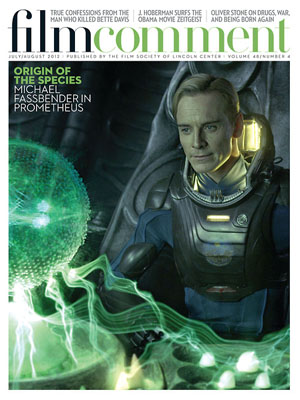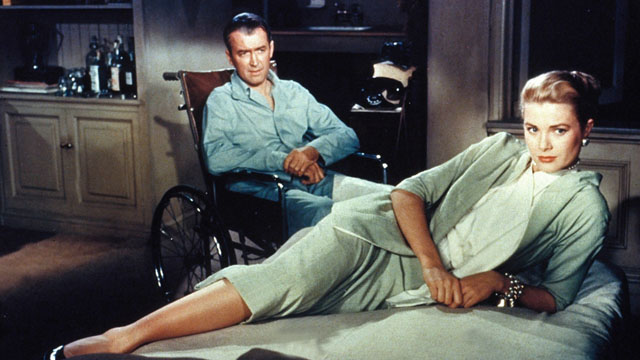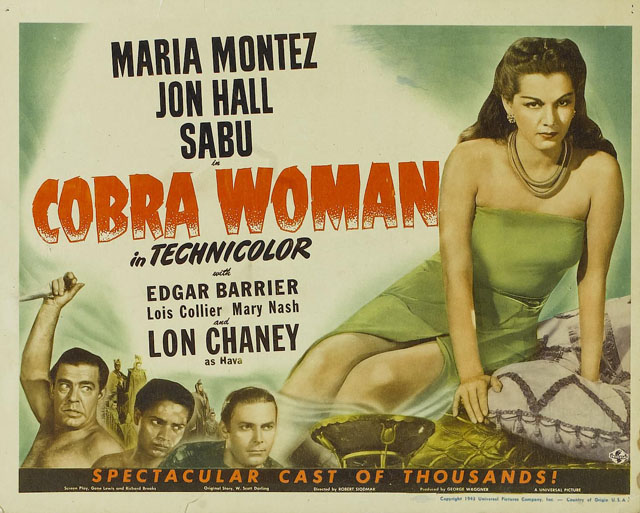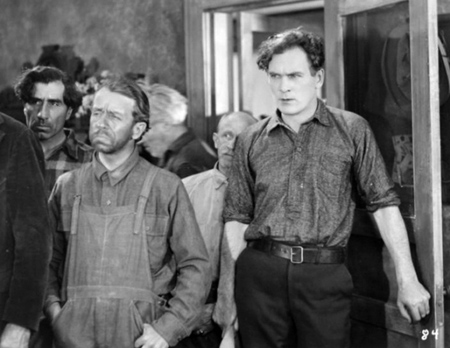The new July/August issue of Film Comment features a batch of reports from this edition of Cannes (Amy Taubin, Joumane Chahine, Richard Peña, Marco Grosoli, and Gavin Smith), Kent Jones on Philippe Garrel’s A Burning Hot Summer, Scott Foundas on Oliver Stone’s Savages, Dan Sullivan on Jay and Mark Duplass’s The Do-Deca-Pentathlon, Chris Chang on André Téchiné’s Unforgivable, Larry Cohen on what he did to Bette Davis by casting her in Wicked Stepmother (1989), Jesse P. Finnegan on cinemetrics.lv, and a “Trivial Top 20: Most Prolific Self-Directors.”
New York. Big days in the big city, with nearly every rep house in town opening a series today or tomorrow, and Melissa Anderson previewing two of them in the Voice—both devoted to Kellys. Invitation to the Dance: Gene Kelly @ 100 runs from tomorrow through July 26: “The effortless, down-to-earth confidence, optimism, and ebullience in Kelly’s performances are what made so many of the MGM classics of the 1940s and ’50s that he was an integral part of soar. Crucially, unlike the top-hatted and tuxed swells Fred Astaire played in musicals of the 1930s, Kelly integrated dancing with characters several notches down on the socioeconomic scale. As the actress Betsy Blair, Kelly’s wife from 1941 to 1957, writes in her 2003 memoir, The Memory of All That: ‘A sailor suit or his white socks and loafers, or the T-shirts on his muscular torso, gave everyone the feeling that he was a regular guy, and perhaps they too could express love and joy by dancing in the street or stomping through puddles…. He democratized the dance in movies.’ Walter Reade’s 23-film Kelly salute showcases not only his work in musicals, both behind and in front of the camera (often both at once), but also his work as a dramatic actor and director of hoofing-free comedies.”
Then there’s Grace Kelly: The Cool Blonde, same dates: “Of her 11 movies, eight of which will be screened at BAMcinématek as part of its tribute to the porcelain-perfect actress, the three she made with Alfred Hitchcock—Dial M for Murder (1954; not included in the series), Rear Window (1954; which kicks off the retro with a one-week run), and To Catch a Thief (1955)—made her the archetypical remote, posh, fair-haired screen divinity. And no one worshipped this demigoddess more than the Master of Suspense himself: Like Scottie obsessively trying to remake working-class, brown-haired Judy into sophisticated, platinum-haired Madeleine in Vertigo (1958), Hitchcock, too, was searching for Grace notes in all the blondes who followed her and almost lured Kelly out of retirement to play the frigid klepto in his last great film, Marnie (1964).” On a related note, by the way, Tom Shone, writing for Intelligent Life, argues that Hitchcock had a “Dorian Gray instinct for counter-casting: divining a mirror-image of the face a star presents to the world, and asking them to play that.”
Film Forum’s Universal 100 extravaganza also opens tomorrow but runs all the way through August 9. “This is what you get when you retro a major Hollywood studio’s centennial,” writes Michael Atkinson in the Voice, “a Mall of America-size grab bag of indulgences, leaving you with two choices: Bask in a favorite or catch up with a neglected oddball. For the former, nobody should have to tell you that seeing Jaws (1975) in late July is an ace in movie golf, nor should screenings of hothouse staples like American Graffiti (1973), Two-Lane Blacktop (1971), The Birds (1963), or Touch of Evil (1958) be avoided for any reason besides overfamiliarity. I’d hate to see the retro zeitgeist swing away from Brazil (1985) and toward E.T.: The Extra-Terrestrial (1982), but it might be too late already…. On the other hand, existential odyssey The Incredible Shrinking Man (1957) and the kitsch bomb of Robert Siodmak’s Cobra Woman (1944) never go out of style.”
Speaking of Siodmak, J. Hoberman has a terrific piece in the New York Times on the nine Siodmak films screening in the series, and he begins by noting that the director is “credited by some scholars with developing the German-French-American synthesis known as film noir and dismissed by others as an impersonal technician whose greatest talent was successively adapting himself to three national movie industries… Along with the other mainly Jewish, Central European émigrés who found refuge in Hollywood, Siodmak infused American crime thrillers with a mix of Expressionist brio and existential fatalism. The critic Andrew Sarris once joked that Siodmak’s ‘American films were more Germanic than his German ones.’ It could also be said that the director’s low-budget debut, the insouciant plein-aire comedy People on Sunday (1930), made in Berlin’s public parks with a youthful group of future exiles (including Siodmak’s then flat-mate Billy Wilder and younger brother Curt) was more French than his French productions.”
“The tenth installment of Premiere Brazil! shows Brazilian filmmakers looking to understand and to preserve the past, while existing in their country’s rapidly changing present,” writes Ela Bittencourt. At MoMA through July 24. Also in the L, Aaron Cutler recommends Lovers of the Arctic Circle (1998), screening tomorrow as part of the ongoing series at the Spectacle Theater, Julio Médem’s 90’s.
And The Clock is back in the City, presented this time by the Lincoln Center Festival. Time Out New York‘s David Fear chats with Christian Marclay, who tells him, “I’ve never been a big cinephile, which may be why I could treat The Clock like a puzzle and force the pieces to fit together in odd ways. But having worked on this project, I enjoy films in a different way now, because I have a better understanding of how complex filmmaking is. When you take something apart, you get a great sense of what it took to originally put it together.” More on The Clock from Peter Bowen at Filmmaker.
San Francisco. In addition to Jonathan Kiefer‘s overview of the Silent Film Festival, opening today and running through the weekend, let’s add three more. Michael Hawley previews each of the titles in the lineup, shahn offers tips on attending, and the Bay Guardian focuses on William Beaudine’s The Canadian, “a little-remembered 1926 drama that proved a major rediscovery when shown to new audiences under the American Film Institute’s banner.”
Los Angeles. And to David Ehrenstein‘s preview of Outfest, let’s add Peter Knegt‘s list of the “13 Films You Must See,” Paul Sbrizzi‘s thorough overview at Hammer to Nail, and, in the LA Weekly, Chuck Wilson‘s brief history of the festival, now in its 30th year, his “5 Gems” to catch this year, plus nine more from Wilson and Ernest Hardy.
Philadelphia. For the City Paper, Shaun Brady previews two docs screening at QFest (today through July 23), Andrea Meyerson’s I Stand Corrected and Kieran Turner’s Jobriath A.D.
Books. Christopher Bray in the New Republic on Howard Hughes’s When Eagles Dared: The Filmgoers’ History of World War II: “Like Wilde’s cynic, Hughes knows the price of everything and the value of nothing. If you want to know which films focus on what campaigns and battles, he is your man. If you want to know which real-life towns and villages and pubs serve as the backdrop to Went the Day Well and The Eagle Has Landed, he is here to help. But if you want to know whether a movie might be worth watching, he is generally way off-beam.”
Jacob Mikanowski for the Los Angeles Review of Books on Andrei Tarkovsky‘s Stalker—and Geoff Dyer‘s Zona: “It’s a book about the limits of criticism as much as it is about the limits of filmmaking.”
In other news. Cinecitta Luce and Google are bringing Italy’s largest film archive, over 100,000 films dating back to 1927, to YouTube. Colin Marshall has details at Open Culture.
For news and tips throughout the day every day, follow @KeyframeDaily on Twitter and/or the RSS feed. Get Keyframe Daily in your inbox by signing in at fandor.com/daily.







